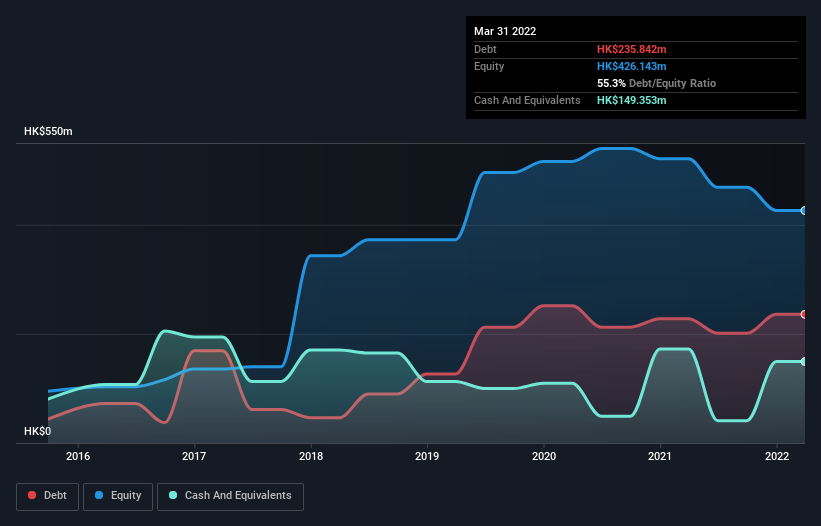
Some say volatility, rather than debt, is the best way to think about risk as an investor, but Warren Buffett famously said that 'Volatility is far from synonymous with risk.' So it might be obvious that you need to consider debt, when you think about how risky any given stock is, because too much debt can sink a company. Importantly, Kwan On Holdings Limited (HKG:1559) does carry debt. But the real question is whether this debt is making the company risky.
When Is Debt Dangerous?
Debt assists a business until the business has trouble paying it off, either with new capital or with free cash flow. In the worst case scenario, a company can go bankrupt if it cannot pay its creditors. While that is not too common, we often do see indebted companies permanently diluting shareholders because lenders force them to raise capital at a distressed price. Having said that, the most common situation is where a company manages its debt reasonably well - and to its own advantage. The first step when considering a company's debt levels is to consider its cash and debt together.
View our latest analysis for Kwan On Holdings
What Is Kwan On Holdings's Net Debt?
As you can see below, Kwan On Holdings had HK$235.8m of debt, at March 2022, which is about the same as the year before. You can click the chart for greater detail. However, because it has a cash reserve of HK$149.4m, its net debt is less, at about HK$86.5m.

A Look At Kwan On Holdings' Liabilities
Zooming in on the latest balance sheet data, we can see that Kwan On Holdings had liabilities of HK$335.7m due within 12 months and liabilities of HK$47.1m due beyond that. Offsetting this, it had HK$149.4m in cash and HK$281.3m in receivables that were due within 12 months. So it can boast HK$47.8m more liquid assets than total liabilities.
This excess liquidity suggests that Kwan On Holdings is taking a careful approach to debt. Due to its strong net asset position, it is not likely to face issues with its lenders. There's no doubt that we learn most about debt from the balance sheet. But it is Kwan On Holdings's earnings that will influence how the balance sheet holds up in the future. So if you're keen to discover more about its earnings, it might be worth checking out this graph of its long term earnings trend.
Over 12 months, Kwan On Holdings made a loss at the EBIT level, and saw its revenue drop to HK$515m, which is a fall of 4.3%. That's not what we would hope to see.
Caveat Emptor
Over the last twelve months Kwan On Holdings produced an earnings before interest and tax (EBIT) loss. Indeed, it lost a very considerable HK$74m at the EBIT level. On a more positive note, the company does have liquid assets, so it has a bit of time to improve its operations before the debt becomes an acute problem. But we'd want to see some positive free cashflow before spending much time on trying to understand the stock. This one is a bit too risky for our liking. There's no doubt that we learn most about debt from the balance sheet. However, not all investment risk resides within the balance sheet - far from it. We've identified 3 warning signs with Kwan On Holdings (at least 1 which is potentially serious) , and understanding them should be part of your investment process.
Of course, if you're the type of investor who prefers buying stocks without the burden of debt, then don't hesitate to discover our exclusive list of net cash growth stocks, today.
If you're looking to trade Kwan On Holdings, open an account with the lowest-cost platform trusted by professionals, Interactive Brokers.
With clients in over 200 countries and territories, and access to 160 markets, IBKR lets you trade stocks, options, futures, forex, bonds and funds from a single integrated account.
Enjoy no hidden fees, no account minimums, and FX conversion rates as low as 0.03%, far better than what most brokers offer.
Sponsored ContentValuation is complex, but we're here to simplify it.
Discover if Kwan On Holdings might be undervalued or overvalued with our detailed analysis, featuring fair value estimates, potential risks, dividends, insider trades, and its financial condition.
Access Free AnalysisHave feedback on this article? Concerned about the content? Get in touch with us directly. Alternatively, email editorial-team (at) simplywallst.com.
This article by Simply Wall St is general in nature. We provide commentary based on historical data and analyst forecasts only using an unbiased methodology and our articles are not intended to be financial advice. It does not constitute a recommendation to buy or sell any stock, and does not take account of your objectives, or your financial situation. We aim to bring you long-term focused analysis driven by fundamental data. Note that our analysis may not factor in the latest price-sensitive company announcements or qualitative material. Simply Wall St has no position in any stocks mentioned.
About SEHK:1559
Kwan On Holdings
An investment holding company, engages in the construction and maintenance works on civil engineering contracts and building works contracts in Hong Kong, the People’s Republic of China, Philippines, and Malaysia.
Adequate balance sheet and fair value.
Similar Companies
Market Insights
Community Narratives



